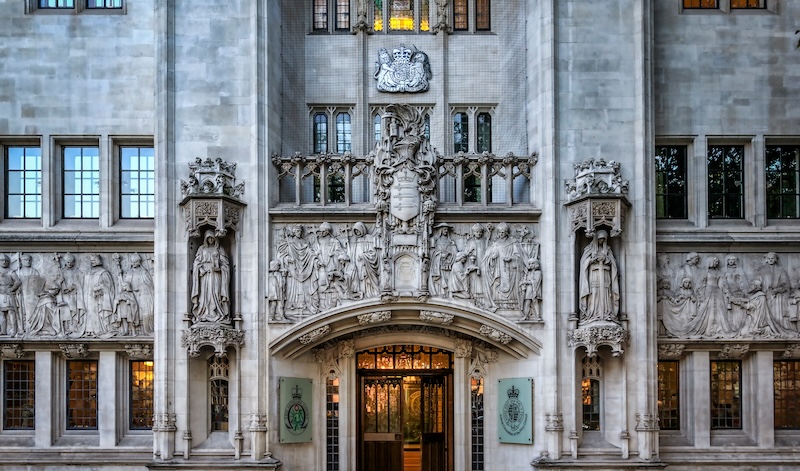Top judges hear case on whether trans women can be considered female under Equality Act

In a case that could have implications in England and Wales for single-sex spaces such as women’s refuges, hospital wards, prisons and changing rooms in, the Supreme Court is hearing arguments today about who falls within the definitions of ‘woman’ and ‘man’ in anti-discrimination law and whether they include people who have been certified as such with a Gender Recognition Certificate (GRC).
The five justices sitting in courtroom one are being flung into the centre of the highly controversial debates around trans rights and gender-critical positions.
The issue has come to the Supreme Court following statutory guidance north of the border in relation to a specific piece of Scottish ‘positive action’ legislation on gender representation on the boards of public bodies. The guidance from the Scottish government says that the definitions of woman and man for that legislation includes those who have been certified as such with a GRC.
The organisation bringing the case, For Women Scotland, argue this is wrong and that equality law, the UK’s Equality Act 2010, was drafted with the ordinary biological meaning of woman and man in mind and that those definitions should not be read as to include trans women or men with a GRC.
Aidan O’Neill KC, their lead counsel and a barrister at Matrix Chambers, told the court this morning that: “The context” of equality law is “the patriarchy” and was introduced in order to “unshackle women from legal disabilities”. He argued that if the definition of woman in the Equality Act 2010 were to include those persons with a GRC, its effect was a “capitulation to that patriarchy”. “And that,” he argued in the packed courtroom, “is not a position which this court in this day and age should uphold.”
The Scottish government’s position is that the case is straightforward because a person who is certified to have the gender of a ‘woman’ by such a certificate is for, all purposes, legally a woman (under gender recognition legislation). The rules around certification have, in effect: ‘re-drawn the boundaries’ of what a woman is and what a man is.
For Women Scotland, however, argue that if this logic is correct, then: “Women as a sex class are being written out of the law,” as Trina Budge, one of the directors of For Women Scotland, tells Legal Cheek:
“If the definition includes those who are certified as women but biologically male, then for this legislation, which is aimed at increasing the level of women’s representation of the boards of public bodies, you could have a board made up entirely of men and it would still have lawfully fulfilled its objective!”
The Equality and Human Rights Commission, the UK’s equality regulator who has intervened in this case, says that the current legal position creates “far-reaching problems with the practical application” of this situation for those who have to provide public services.
In a statement, Baroness Kishwer Falkner, chairwoman of the EHRC, said:
“We deem this to be a wholly unsatisfactory situation, which parliament should address with urgency… It creates significant inconsistencies, which impair the proper functioning of the Equality Act 2010.”
The Scottish government stated it couldn’t comment on live proceedings but issued a statement that it is:
“Committed to dignity and respect for all. Supporting women is at the heart of the Scottish government’s vision for a fairer Scotland, and we are investing record levels of funding, including significant levels in frontline services to support victims of violence against women and girls.”
Amnesty UK also intervened in the case and their position supports the line of argument of the Scottish government: “Legal gender recognition as it works now is essential for trans people to enjoy the full spectrum of human rights each of us is entitled to, and live free from fear of discrimination,” a spokesperson said. “Too many media outlets, politicians across parties and online commentators, continue to spend an eye-watering amount of time berating trans people — who make up just 1% of the population — and spreading dangerous misinformation.”
A spokesperson for Stonewall, the LGBTQ rights charity, told Legal Cheek:
“We all want to live in a society where all individuals are protected under the law. Since 2004, people have been able to apply for a GRC, which legally recognises their affirmed gender in the UK. The Scottish courts have confirmed twice now that, if people legally change their gender and hold a GRC, they also gain the associative legal protections of that gender under the Equality Act.”
The hearing continues tomorrow, with a decision expected in the next three to six months.
